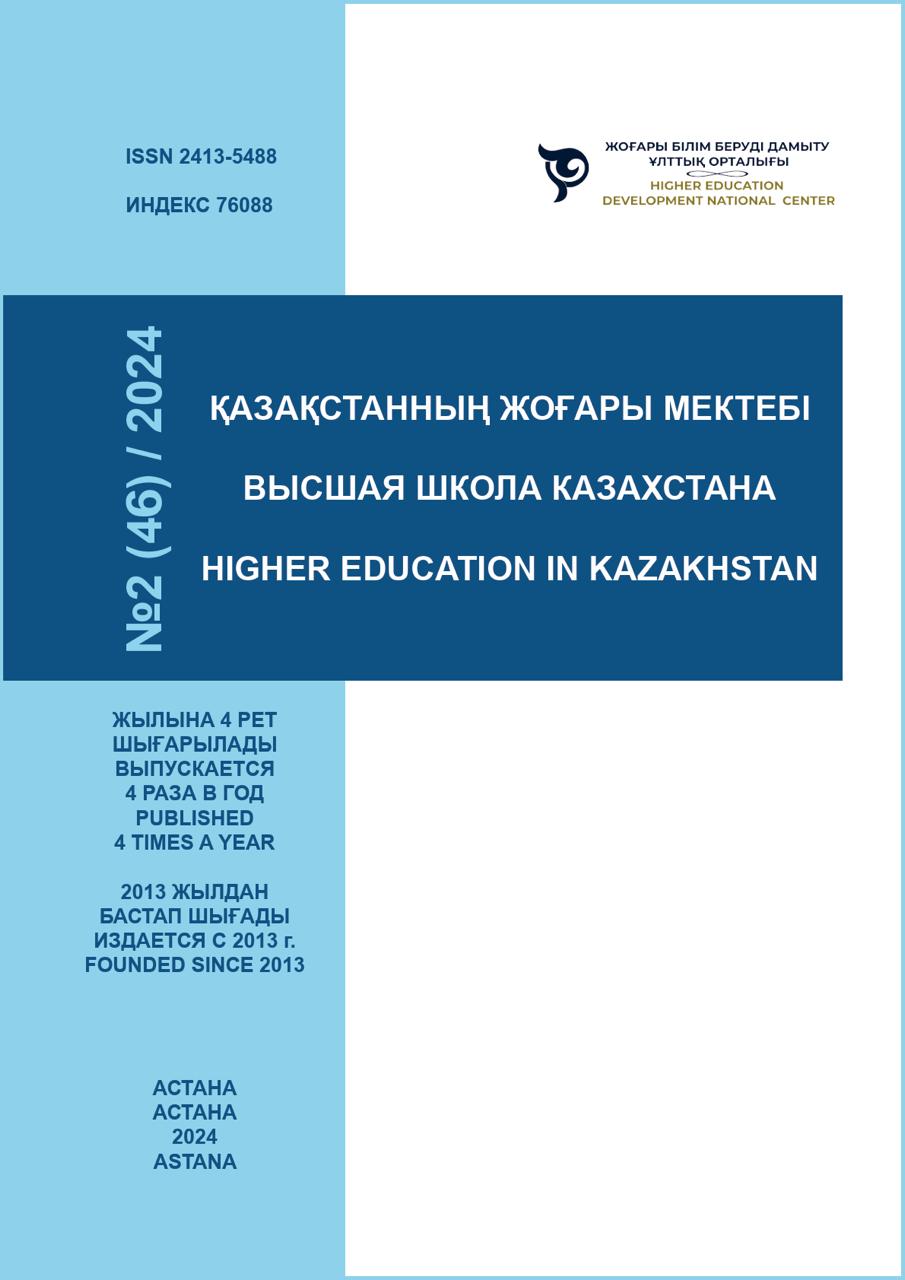APPLICATION OF PRACTICE-ORIENTED EDUCATION TECHNOLOGIES IN TRAINING STUDENTS IN ENGINEERING AND SCIENCE SPECIALTIES
DOI:
https://doi.org/10.59787/2413-5488-2024-46-2-56-67Кілт сөздер:
тәжірибеге бағытталған білім беру технологиялары, тәжірибе негізінде оқыту, кейс-технологиялар, жобалық оқыту, жұмыс орнында оқыту, инженерлік білім, жаратылыстану-ғылыми білім беруАңдатпа
Modern social, economic, technical transformations make adjustments in the organization and training of personnel in engineering and natural science specialties, in the basic elements of the structure and content of educational programs. Adjustment of educational programs taking into account modern trends allows providing graduates with competitive advantages in the labor market. At the same time, the problems related to the imbalance of theoretical and practical training, the gap between the skills and competencies formed in students and the needs of the industrial sector, non-adaptation of technologies and teaching methods to the specifics of academic disciplines and expected learning outcomes are still relevant in engineering and science education. Accordingly, the aim of the work was to analyze the peculiarities of application of practice-oriented learning technologies in engineering and science training. In this work the most important learning outcomes for students and employers were determined, the main deficiencies in the skills and competencies of graduates were identified, students' satisfaction with the quality of organization and conduct of practical classes and professional practices was assessed, practice-oriented educational technologies used in teaching professional disciplines were ranked by the degree of importance. Based on the obtained results, a significant correlation between the responses of students and employees of companies/enterprises has been established, the effectiveness of the application of practice-oriented educational technologies to increase students' motivation for learning and responsibility for learning outcomes has been shown, it has been established that employees of companies/enterprises attach greater importance to learning outcomes related to the development of students' personal, social and technical skills and competencies.
Әдебиеттер тізімі
Anwar, M., Hidayat, H., Yulistiowarno, I. P., Budayawan, K., Zulwisli, Osumah, O.A., Ardi, Z. (2022). Blended Learning Based Project In Electronics Engineering Education Courses: A Learning Innovation after the Covid-19 Pandemic . International Journal of Interactive Mobile Technologies, 16(140, 107–122. https://doi.org/10.3991/ijim.v16i14.33307
Basavaiah, J., Anthony, A. A., Patil, C. M. (2021). Transformation of engineering education through student centric learning. International Journal of Learning and Teaching, 13(1), 32-41. https://doi.org/10.18844/ijlt.v13i1.5137
Drakatos, N., Tsompou, E., Karabatzaki, Z., & Driga, A. M. (2023). The contribution of online gaming in Engineering education. Eximia Jornal, 8, 14–30. https://www.eximiajournal.pluscommunication.eu/index.php/eximia/article/view/239
Gope, D., Gope, A. (2022). Students and academicians views on the engineering curriculum and industrial skills requirement for a successful job career. Open Education Studies, 4(1), 173-186. https://doi.org/10.1515/edu-2022-0011
Gutierrez-Bucheli, L., Kidman, G., Reid, A. (2022). Sustainability in engineering education: A review of learning outcomes. Journal of Cleaner Production, 330, 1-15. https://doi.org/10.1016/j.jclepro.2021.129734
Jia, L., Jalaludin, N.A., Rasul, M.S. (2023). Design Thinking and Project-Based Learning (DT-PBL): A Review of the Literature. International Journal of Learning, Teaching and Educational Research, 22(8), 376-390. https://doi.org/10.26803/ijlter.22.8.20
Karstina, S.G. (2021). Educators Training in the Context of Socio-Economic and Technological Trends of Kazakhstan. In: Auer, M.E., Rüütmann, T. (eds) Educating Engineers for Future Industrial Revolutions. ICL 2020. Advances in Intelligent Systems and Computing, vol. 1329, p. 87-94. Springer, Cham. https://doi.org/10.1007/978-3-030-68201-9_7
Karstina, S.G. (2022a). Engineering Training in The Context of Digital Transformation , 2022 IEEE Global Engineering Education Conference (EDUCON), Tunis, Tunisia, 2022, pp. 1062-1068. https://doi.org/10.1109/EDUCON52537.2022.9766473
Karstina, S.G. (2022b) The Role of Inter-institutional Cooperation in Engineering Training. In: Auer, M.E., Hortsch, H., Michler, O., Köhler, T. (eds) Mobility for Smart Cities and Regional Development - Challenges for Higher Education. ICL 2021. Lecture Notes in Networks and Systems, vol. 389, p. 67-74. Springer, Cham. https://doi.org/10.1007/978-3-030-93904-5_7
Karstina, S. (2023). The Role of Group Project-Based Learning in Engineering Training. In: Auer, M.E., Pachatz, W., Rüütmann, T. (eds) Learning in the Age of Digital and Green Transition. ICL 2022. Lecture Notes in Networks and Systems, vol. 634, p. 239–245. Springer, Cham. https://doi.org/10.1007/978-3-031-26190-9_24
Karstina, S. (2024). Applying a Level Assessment System in Group Project-Based Learning for Teachers of Engineering Disciplines. In: Auer, M.E., Cukierman, U.R., Vendrell Vidal, E., Tovar Caro, E. (eds) Towards a Hybrid, Flexible and Socially Engaged Higher Education. ICL 2023. Lecture Notes in Networks and Systems, vol. 900, 343-354. Springer, Cham. https://doi.org/10.1007/978-3-031-52667-1_33
Lin, Y.-T. (2021). Effects of Flipped Learning Approaches on Students’ Learning Performance in Software Engineering Education. Sustainability, 13, 9849, 1-16. https://doi.org/10.3390/su13179849
Marhadi, H., Sapriya, S., Hakam, K. A., Budimansyah, D. (2023). The role of the project-based learning approach in optimizing student involvement in the learning process. Cypriot Journal of Educational Sciences, 18(3), 544-555. https://doi.org/10.18844/cjes.v18i3.8760
Sue, C., Jamison, E., Fuher, J., Wang, A., Huang-Saad,A. (2022). Experiential learning implementation in undergraduate engineering education: a systematic search and review. European Journal of Engineering Education, 47(6), 1356-1379. https://doi.org/10.1080/03043797.2022.2031895
Sue, C., Jamison, E., Fuher, J., Wang, A., Huang-Saad,A. (2022). Experiential learning implementation in undergraduate engineering education: a systematic search and review. European Journal of Engineering Education, 47(6), 1356-1379. https://doi.org/10.1080/03043797.2022.2031895
Udeozor, C., Toyoda, R., Abegão, F.R., Glassey,J. (2022). Digital games in engineering education: systematic review and future trends . European Journal of Engineering Education, 1-19. https://doi.org/10.1080/03043797.2022.2093168
Van den Beemt, A., Groothuijsen, S., Ozkan, L., Hendrix, W. (2023). Remote labs in higher engineering education: engaging students with active learning pedagogy. Journal of Computing in Higher Education, 35, 320–340. https://doi.org/10.1007/s12528-022-09331-4
Wulandari,W.T. (2023). Contextual Learning Approach: Development of Worksheet in Physics Subjects. Schrödinger: Journal of Physics Education, 4(2), 53 - 58. http://cahaya-ic.com/index.php/SJPE
Zaher, A.A., Hussain, G.A., Altabbakh, H. An (2023). Active Learning Approach for Applying STEAMeD-Based Education in Engineering Programs. International Journal of Engineering Pedagogy (iJEP), 13(3), 4-26. https://doi.org/10.3991/ijep.v13i3.34819

Жүктеулер
Жарияланды
Журналдың саны
Бөлім
Лицензия
Авторлық құқық (c) 2024 "Қазақстанның жоғары мектебі" ғылыми-сараптамалық журналы

Бұл жұмыс лицензия бойынша лицензияланғанCreative Commons Attribution-ShareAlike 3.0 Unported License.





